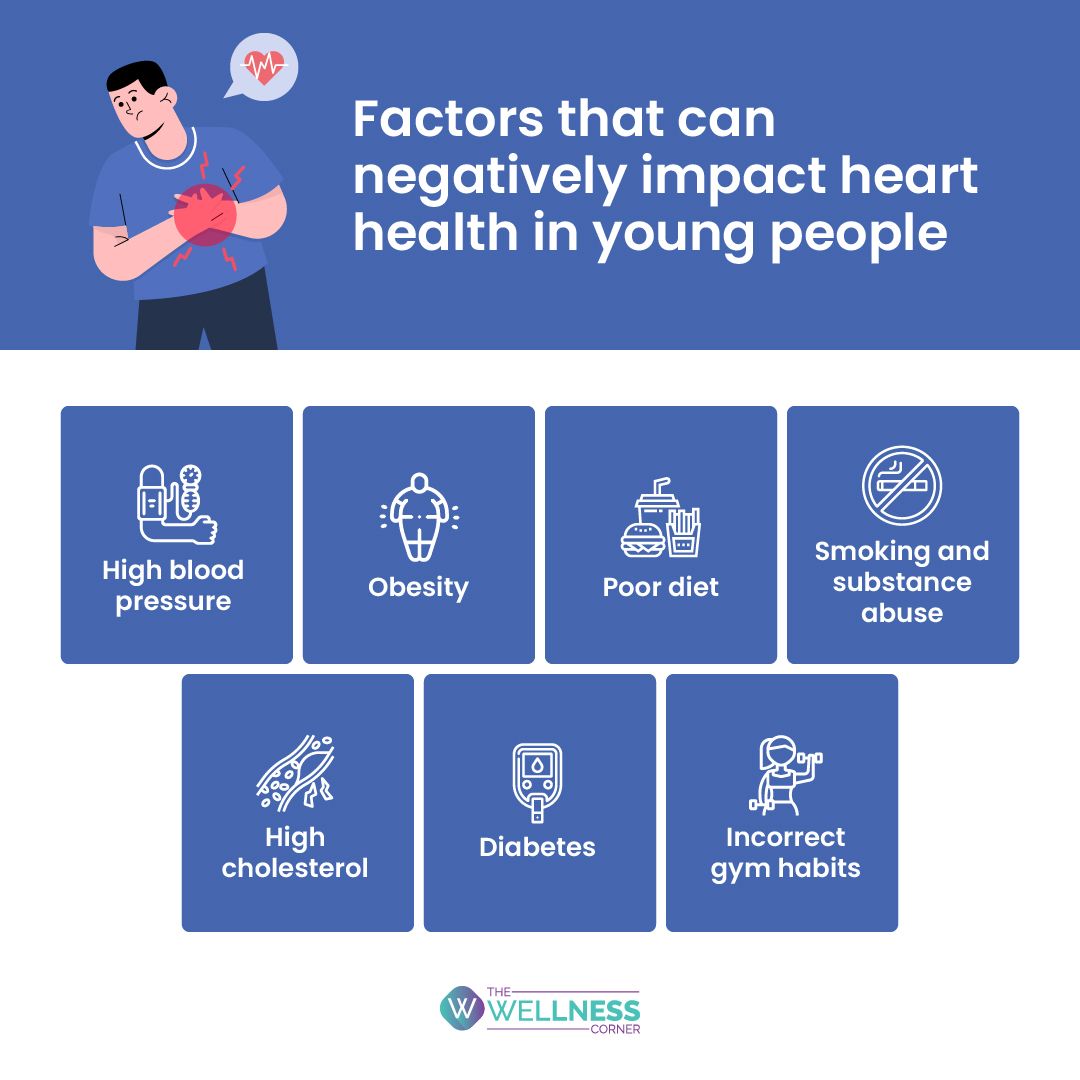Factors That Worsen Heart Health In Visibly Healthy Young People
27 months ago
4 minute read.

In a world where youth and vitality often seem synonymous with good health, it is easy to overlook the fact that heart problems can affect even the seemingly fit and energetic young individuals.
Heart health is a crucial aspect of overall well-being, and it's not limited to older adults or individuals with visible health issues. While we tend to associate heart problems with aging or certain risk factors, it is essential to recognize that young people, even if they appear healthy, are not immune to heart-related challenges.
Many young people who appear fit and active may unknowingly possess risk factors that may contribute to poor heart health. These risk factors, if left unaddressed, can lead to the development of cardiovascular diseases later in life. Therefore, young individuals must recognize and address these factors to maintain optimal heart health.
Factors that can negatively impact heart health in young people
Conditions and behaviors that put people at risk for heart disease appearing at younger ages are:

1. High Blood Pressure
High blood pressure (hypertension) is often perceived as a health concern primarily affecting older individuals. However, it can also be prevalent in young people, even if they appear visibly healthy. Uncontrolled high blood pressure puts a strain on the heart and blood vessels, increasing the risk of heart disease, stroke, and other cardiovascular complications.
Young individuals may develop high blood pressure due to genetic factors, poor lifestyle choices, stress, or underlying health conditions. Regular blood pressure monitoring, adopting a heart-healthy diet, reducing sodium intake, engaging in regular physical activity, and managing stress are crucial strategies for maintaining optimal blood pressure levels and protecting heart health.
2. Obesity
While visibly healthy individuals may not display outward signs of obesity, excess body weight can have detrimental effects on the cardiovascular system. Obesity increases the risk of high blood pressure, high cholesterol levels, diabetes, and inflammation, all of which contribute to the development of heart disease.
Moreover, carrying excess weight puts additional strain on the heart, making it work harder to pump blood effectively. Prioritizing a healthy weight not only benefits overall well-being but also plays a significant role in protecting heart health in the long term.
3. Poor Diet
A balanced and nutrient-rich diet is essential for optimal heart health. Unfortunately, many young individuals fall into the trap of consuming processed foods, sugary drinks, and excessive amounts of sodium. These dietary choices contribute to high cholesterol levels, elevated blood pressure, and weight gain, all of which increase the risk of heart disease. Emphasizing a diet rich in fruits, vegetables, whole grains, lean proteins, and healthy fats is crucial for maintaining a healthy cardiovascular system.

4. Smoking and Substance Abuse
While the harmful effects of smoking and substance abuse are widely known, young people sometimes underestimate the impact these behaviors can have on heart health. Smoking damages blood vessels increases blood pressure and accelerates the development of atherosclerosis. Similarly, illicit drug use, including cocaine or methamphetamine, can lead to heart rhythm abnormalities, heart attacks, and even sudden cardiac death. Quitting smoking and avoiding substance abuse are vital steps in safeguarding heart health.
5. High Cholesterol
Elevated levels of cholesterol, specifically low-density lipoprotein (LDL) cholesterol, can contribute to the development of atherosclerosis, a condition where fatty deposits build up in the arteries and restrict blood flow to the heart. Over time, this can lead to an increased risk of heart disease and heart attacks.
Adopting a heart-healthy diet low in saturated and trans fats, engaging in regular physical activity, and avoiding excessive intake of processed foods can help manage cholesterol levels. In some cases, medication may be prescribed by a healthcare professional to control cholesterol levels. Regular cholesterol screenings and monitoring are essential for young people to identify and address any potential issues proactively.
6. Diabetes
Diabetes is a chronic disease that causes increased blood sugar levels. While it is commonly associated with older individuals, the prevalence of diabetes in young people is increasing. Diabetes, especially type 2 diabetes, is closely linked to heart health. Poorly managed diabetes can damage blood vessels and nerves, leading to an increased risk of heart disease, heart attacks, and stroke.

7. Incorrect Gym Habits
Individuals who frequent the gym may unknowingly engage in incorrect or unsafe workout habits that can have negative implications for heart health. Some common examples include excessive weightlifting without proper form or guidance, overtraining without allowing adequate rest and recovery, and ignoring warning signs of physical strain or exhaustion.
These practices can lead to injuries, elevated blood pressure, and even heart complications in severe cases. Young individuals must approach their gym workouts with caution, seek guidance from qualified fitness professionals, and listen to their bodies. Understanding proper exercise techniques, incorporating rest days, and gradually progressing intensity and duration can help prevent injuries and support heart health during exercise.
Conclusion
Maintaining a healthy heart is a lifelong commitment, even for visibly healthy, young individuals. By addressing the factors that can negatively impact heart health, such as a sedentary lifestyle, unhealthy dietary choices, stress, tobacco, and substance use, young people can take proactive steps to preserve their cardiovascular well-being. Engaging in regular physical activity, adopting a balanced and nutritious diet, managing stress levels, and avoiding harmful habits can help ensure a healthy heart and a promising future.
Remember, heart health is not determined solely by appearance but also by lifestyle choices. It is never too early to prioritize cardiovascular well-being and establish habits that promote a healthy heart throughout life.
Leave a Comment
Related Articles
Health Checks @ Home
Service
Explore
© 2026 Truworth Health Technologies Pvt. Ltd.




